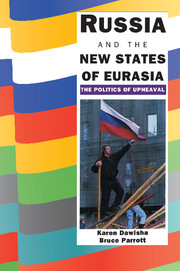Book contents
- Frontmatter
- Contents
- Preface
- Maps
- Introduction
- 1 The Legacies of History
- 2 National Identity and Ethnicity
- 3 The Impact of Religion
- 4 Political Culture and Civil Society
- 5 The Impact of Economics
- 6 Foreign Policy Priorities and Institutions
- 7 Military Issues
- 8 The Nuclear Factor
- Conclusion
- Appendix A Chronology of Events, January 1992 to October 1993
- Appendix B Compendium of Leadership and Institutional Changes in the Eurasian States, January 1992 to October 1993
- Appendix C Soviet Census Data, Union Republic and ASSR, 1989
- Notes
- Index
7 - Military Issues
Published online by Cambridge University Press: 06 July 2010
- Frontmatter
- Contents
- Preface
- Maps
- Introduction
- 1 The Legacies of History
- 2 National Identity and Ethnicity
- 3 The Impact of Religion
- 4 Political Culture and Civil Society
- 5 The Impact of Economics
- 6 Foreign Policy Priorities and Institutions
- 7 Military Issues
- 8 The Nuclear Factor
- Conclusion
- Appendix A Chronology of Events, January 1992 to October 1993
- Appendix B Compendium of Leadership and Institutional Changes in the Eurasian States, January 1992 to October 1993
- Appendix C Soviet Census Data, Union Republic and ASSR, 1989
- Notes
- Index
Summary
During the Soviet era outside observers commonly remarked that one of the Soviet system's most distinctive features was its unprecedented drive to accumulate military power. Today the military legacy of that drive poses a series of domestic and international problems that together constitute what is arguably the gravest challenge to the countries of Eurasia.
The Soviet military legacy may be most obvious in the struggle of several of the new states to claim former Soviet military units based on their territories and in the continued stationing outside Russia of about 250,000 Russian Federation troops. The failure of any multinational command to emerge has shifted the latter forces from Soviet to Russian military control. These Russian troops may nominally be CIS units, but the fact that most are slated to be withdrawn to Russia and are under Russian command underscores whom they truly represent.
The authority of the political leaders in the new states is undermined by the stationing on their soil of large numbers of foreign troops who are reluctant to return home. The officers in these units, mainly but not only Russian, have frequently spent their whole lives outside of Russia, on the highly-armed periphery of the Soviet Union, and have frequently married and settled in these areas. Russian officers are naturally resistant to the idea of redeploying their troops and families back to Russia where, due to the lack of housing, they must often live in tent camps.
Some, therefore, have become active in supporting a renewed Russian or Soviet imperial drive that might enable them, if the independence of these states can be undermined or ended altogether, to remain in place.
- Type
- Chapter
- Information
- Russia and the New States of EurasiaThe Politics of Upheaval, pp. 231 - 257Publisher: Cambridge University PressPrint publication year: 1994



